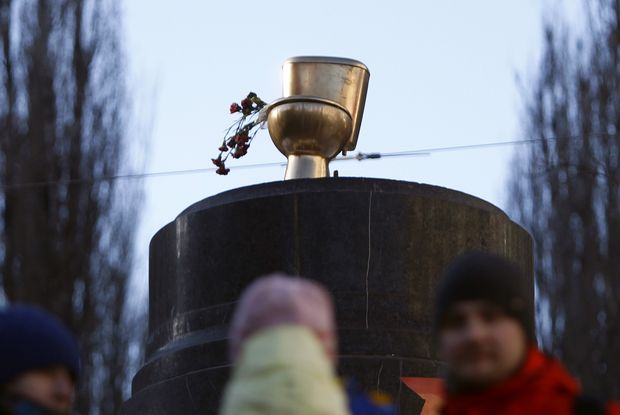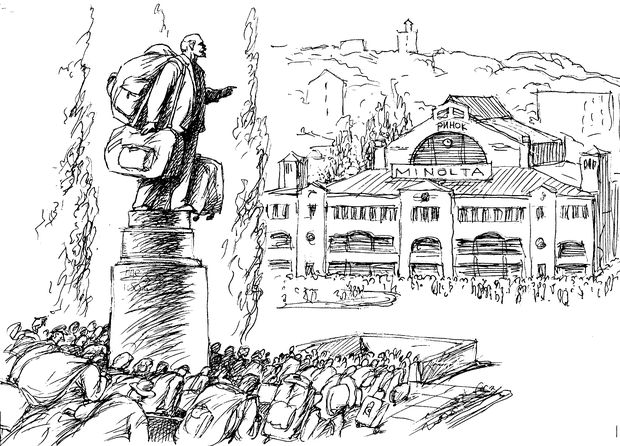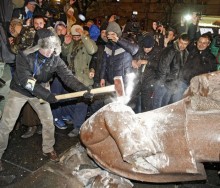DIMENSION No. 1
We live in a society where modernity and tradition are tangled in a strange knot. The geography of these tangles rests on certain symbolic places, the places of memory or sacrality. The struggle between tradition and modernity shows in the attitude to these places. Desecration of the gods that have lost power is part of the Kyivan tradition. For instance, the declined paganism lost Perun and other idols under blows from a Christian prince. But, to tell the truth, the prince brought down Perun with his face open, while the national radicals, who toppled the Lenin statue, were hiding their faces behind masks, acted suddenly and hastily in the fear of being repulsed.
This is obviously a victory of the traditional Kyivan way of thinking which calls for erasing a weak or a lost one from memory. This also shows in the renaming of Kyiv’s streets and localities, when a place is denied the right to bear a name of its own. Instead of restoring Kyiv place names, the authorities add new ones in accordance with their fast-changing ideological leanings.
If modernity had won in this competition with tradition, the Lenin monument would have still been removed, albeit in a different way, – with explanation of why and what for and after a public debate.
As for this situation, I have inquired about the opinion of some native Kyivites (I still consider myself a stranger because, although I have been living in Kyiv for most of my lifetime, I was born and raised elsewhere). All the three (I know no more Kyivites) reacted very painfully to this – for them, the toppling of Lenin was a slap in the face. Following this, they stopped visiting the Maidan and no longer support it, to say the least. They viewed this point as the place of their first dates and life stages, not as a Leninist symbol. The fond memories of this place were ruined and vilified by what they call aliens.

REUTERS photo
It is important for me, rationalist, that one of the factors that triggered protests was an act of disrespect for the Kyiv public. I am convinced that the center of my country’s capital is not a place for a Lenin monument and Leninism. But it would have been right and more acceptable for Kyivites if the statue had been torn down by public approval. If this step were the result of a debate, it would be really of great importance. In that case it would mean renouncing a totalitarian ideology and Leninism as a result of understanding why it should be done so. But what we recently saw was a triumph of the same traditional and terrible principle which Leninism also adhered to.
I would interpret young nationalists’ radicalism as return of the ousted and forbidden fears that have reemerged in the children and grandchildren of those who were afraid of Lenin and the violence machine he had built. The “great leader’s” statue fell in an act of political carnival, but it may stage a comeback when a time comes to “let off steam” again from the Freudian Id.
DIMENSION No. 2
I view the recent installation of a “golden toilet seat” on the pedestal instead of Lenin as an act of contemporary art. I do not know the author of this “oeuvre,” but I guess it is an ultra leftist artist. The artist thus shows in an esthetic dimension that consumerism, late capitalism and its symbols, are winning in the current conflict between the nationalists and the communists. For what is Ukrainian capitalism in its most “refined” shape? It is the “golden toilet seat of Megazhyria.” As a collector of misprints, I recently came across this little devil in the official press – instead of “Mezhyhiria” they printed “Megazhyria” (literally: “too much fat”).

Sketch by Anatolii KAZANSKY from The Day’s archives, 1997
Yanukovych’s “golden toilet seat,” so much hyped by Ukrainian bloggers, is the ideal expression of “megazhyria.” When you have achieved all kinds of success, all you have to do is acquire a receptacle made of a precious metal. The anal theme dominates the obscene vocabulary of the Ukrainians, which only confirms Kuchma’s truism “Ukraine is not Russia,” for the Russians prefer things genital.
So the toilet seat monument is a monument to the new true winner in Kyiv, no matter what the current political struggle may end with. This reconciles, in a way, Lenin and Bandera.
DIMENSION No. 3
With due account of the two previous opinions, I think that, in spite of the declared aspiration for Europeanism, the present-day Maidan is still not the embodiment of humanism and rationalism, the foundations of a united Europe. And we, intellectuals who support demands for democratization and liberalization in Ukraine, should, above all, try to improve ourselves and work with those on our side of the barricades.
Mykhailo Minakov is a Ukrainian philosopher, researcher of contemporary ideological processes, and editor-in-chief of the journal Ideolohia i polityka







